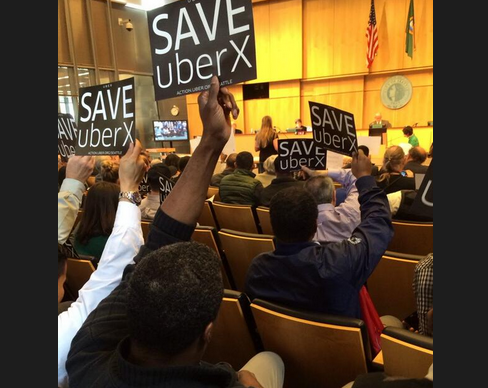
The age of taxis is out and the time for ridesharing is now. Ridesharing, a new mechanism of getting from one place to another, has passengers using their phones to request cars from companies like Lyft, Uber, and Sidecar via these companies’ apps. It’s a great way for drivers to make some extra money, using their own cars to take passengers to their destinations.
As of late, even as the new technology becomes increasingly popular among consumers, local government and taxi companies become less and less welcoming. Using consumer safety as the pretext, city councils and transportation commissions are trying to enact policies that would restrict the ridesharing services. For purely financial reasons, taxi companies, many of which are criticized for shoddy customer service, are threatened by the new competition.
But the rideshare companies won’t go down without a fight. The restrictions, they argue, only serve to damage small business while fortifying transportation monopolies in major metropolitan areas like Chicago, Las Vegas, Los Angeles and Seattle. They’ve turned to “grassroots” campaigns, using social media to call for help. Given their wild popularity with customers, it’s not surprising that people have come to rideshare companies’s aid.
One such campaign targeted the Seattle City Council after it imposed a cap on the number of Uber drivers on the road. In September 2013, Seattle’s Uber launched a hashtag campaign “#SAVEuberXsea” and, since then, the hashtag use has increased. In the past week in particular, people have posted with the hashtag to support the company, as the Seattle City Council prepared for a March 17 vote on whether to remove the cap. According to Simply Measured, Uber advocates did not disappoint, making over 21,000 daily impressions and potentially 250,000 total impressions.
Unfortunately for the new company, its social media efforts came to no avail. Seattle City Council sided with the taxi industry and voted 6-3 to keep the limitations on total Uber drivers.
.@SeattleCouncil votes 6-3 against removing caps of numbers of uberX vehicles. We appreciate you, @CityhallTom @SallyBagshaw @CouncilmanTim.
— Uber Seattle (@Uber_SEA) March 17, 2014
While the company may not have succeeded in changing the minds of Seattle councilmen, in many ways the social media campaign did prove successful. The campaigns got Uber’s name out and earned the company good PR as a small, innovative business struggling in a monopolized industry. (The campaign stressed that a little competition never hurt anyone.) The campaign also promoted consumer loyalty, accruing support from a large, proactive and vocal base.
Check out Uber’s hashtag campaign, with some of the latest tweets from Uber and its supporters:
.@SeattleCouncil: Which driver gets to stay on the road? #SaveUberXSea http://t.co/POUWVEI63Z pic.twitter.com/jGemPZaSoa
— Uber Public Policy (@Uber_PubPolicy) March 13, 2014
Thank you SO much for your support, #Seattle! Keep sharing the petition: http://t.co/fwLpxOpquE Let's #SAVEuberXsea!
— Uber Seattle (@Uber_SEA) March 17, 2014
We're here at City Hall! Join us if you can. Can't make it? You can watch live here at 2pm: http://t.co/iGJwZlxBvC #SAVEuberXsea
— Uber Seattle (@Uber_SEA) March 17, 2014
Our General Manager Brooke Steger is speaking during public comment. #SAVEuberXsea pic.twitter.com/w7wjfehBWM
— Uber Seattle (@Uber_SEA) March 17, 2014
With today's decision re: @Uber_SEA , has #Seattle lost all credibility to claim that we're a startup-friendly city?
— Dan Jensen (@dansjensen) March 17, 2014
Disappointed by @SeattleCouncil vote against innovation by capping @Uber_SEA. Shouldn't be punished for providing better service.
— AK (@andhecon) March 18, 2014
Via Simply Measured



